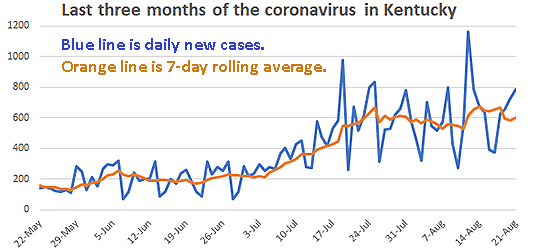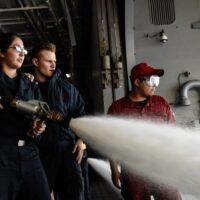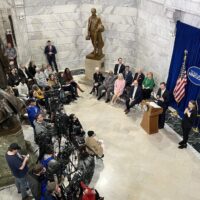
The coronavirus continued to change life in Kentucky on Friday, as Churchill Downs announced that the Kentucky Derby will be run without spectators, and school districts that had started in-person classes switched to online instruction due to infections.
Gov. Andy Beshear announced 785 new cases of the virus, the state’s sixth highest one-day total, tied with the same number on Aug. 13. The seven-day rolling average rose to 600, but the share of Kentuckians testing positive for the virus in the last seven days remained stable at 5.18 percent.
Hospitalizations for COVID-19 in Kentucky stood at 590, less than most recent days, but 166 of them were in intensive-care units, apparently the largest ICU number so far.
The Derby, rescheduled for Sept. 5, was slated to be run in front of a 40% capacity crowd at Churchill Downs, with masks and social distancing required. But the track cited “growing concerns about how you keep a crowd safe, even with social distancing rules in place,” the Courier Journal reports.
Churchill Downs CEO Kevin Flanery said that with Louisville in the “red zone” of the White House Coronavirus Task Force, and case rates rising, “We just couldn’t figure out how to responsibly do it.” Beshear called the change “right and responsible.”
Beshear has recommended that schools wait until Sept. 28 to begin in-person teaching, but several districts have gone ahead this week and more plan to do so next week. But some that have already opened are reversing course due to infections.
Public schools in Green County, the first to start in-person learning, said they would move online for at least two weeks after increased coronavirus activity and unofficial notice of a high-school employee testing positive. The county had 25 new cases Thursday, by far the most in the 10 counties served by the Lake Cumberland District Health Department, which had 55. The increase was the district’s largest in one day, department Director Shawn Crabtree told the Lexington Herald-Leader .
Also in the district, the Gospel Christian School in Clinton County, which opened to in-person classes Aug 4, moved online after two students tested positive, the Herald-Leader reports. Crabtree said several students had been in contact with a student who tested positive.
Public schools in Louisville and Lexington said they would not begin football practice Monday, the first day allowed by the Kentucky High School Athletic Association. The Lexington school board is to discuss the issue at a special meeting Monday. WKYT-TV reported that Henry Clay High School in Lexington had canceled its first two football games.
Kentucky State University in Frankfort suspended all in-person events not related to classes after President Christopher Brown saw what he called a “troublesome” video of a gathering that was a “flagrant violation of standing protocols,” ignoring social-distancing guidelines.
The University of Kentucky said it will re-test 5,500 students in fraternities and sororities, who have a positive-test rate of 3%; the campus-wide rate is 1%. Thirty of the 49 students in isolation after testing positive for the virus come from two fraternity houses on campus; those fraternities will continue to isolate, UK said.
Beshear reported eight deaths, raising the state’s toll to 864. The fatalities were a 49-year-old man from Clark County; a 92-year-old woman from Green County; a 92-year-old woman and a 71-year-old man from Jefferson County; a 78-year-old man from Lewis County; a 56-year-old man from Madison County; a 77-year-old woman from Montgomery County; and a 63-year-old woman from Taylor County.
“It’s going to be a hard month,” Beshear said in a news release. “Let’s make sure we don’t do things that are going to spread this virus because ultimately, they do take a real human toll.”
Jefferson County had nearly 33% of the day’s new cases, with 257. Counties with 10 or more were Christian and Fayette, 35 each; Oldham, 32; Green, 26; Calloway and Warren, 18 each; Nelson, 16; Boone and Bullitt, 14 each; Madison, 13; Clark, Franklin, Hardin, Kenton, Pulaski, 12 each; and Lewis and McCracken, 10 each.
In other COVID-19 news Friday:
- The online portal to request an absentee ballot for the Nov. 3 election did not open as scheduled, but will Monday, to “make sure it’s fully operational,” State Board of Elections Executive Director Jared Dearing told the Lexington Herald-Leader. The govoteky.com portal is to be open through Oct. 9. Dearing said voters should not expect to get a requested ballot until mid- to late September.
- Tom Frieden, former director of the Centers for Disease Control and Prevention, said on CNN that it’s likely that masks will have to be worn for more than a year because it will take time to quash the pandemic. “Covid unfortunately is here to stay,” and the sooner the country gets used to that, the sooner it can get back to something like normal, Frieden said.
- University of Kentucky researchers are assessing interest in public participation in research for a coronavirus vaccine. Anyone interested in participating can take a brief survey at stopcovidky.com.
- There’s more evidence that children may play a larger role in spreading the virus: A study in the Journal of Pediatrics “found that some children have high levels of virus in their airways during the first three days of infection despite having mild symptoms or none at all — suggesting their role in community spread may be larger than previously believed,” The Washington Post reports. “One of the study’s authors, Alessio Fasano, a physician at MassGeneral Hospital for Children , said that because children tend to exhibit few if any symptoms, they were largely ignored in the early part of the outbreak and not tested. But they may have been acting as silent spreaders all along.”
- President Trump blocked the Food and Drug Administration from regulating virus tests, over FDA’s vigorous objections, the Post reports : “The new policy stunned many health experts and laboratories … Some public-health experts warned the shift could result in unreliable coronavirus tests on the market, potentially worsening the testing crisis that has dogged the United States if more people get erroneous results.”
- “The Centers for Medicare and Medicaid Services wants nursing homes to ramp up efforts to control COVID-19 inside facilities after the number of residents infected with and dying from the highly contagious virus has reached a record,” MedPage Today reports. There is little evidence that secondhand smoke can carry the virus, but the smell of a cigarette can be a warning, the Post reports: “Researchers and physicians say that merely being able to smell someone’s cigarette is a warning sign you’re breathing air that was just in someone else’s lungs.”
(Kentucky Health News is an independent news service of the Institute for Rural Journalism and Community Issues, based in the School of Journalism and Media at the University of Kentucky, with support from the Foundation for a Healthy Kentucky.)





